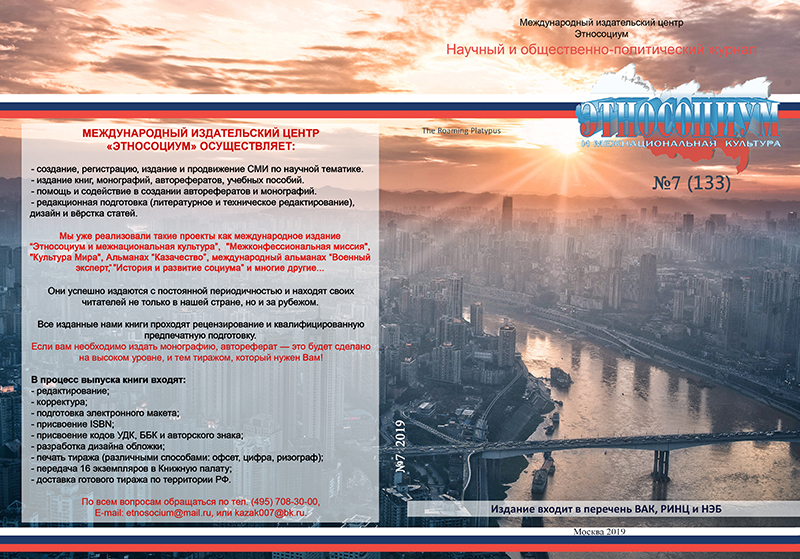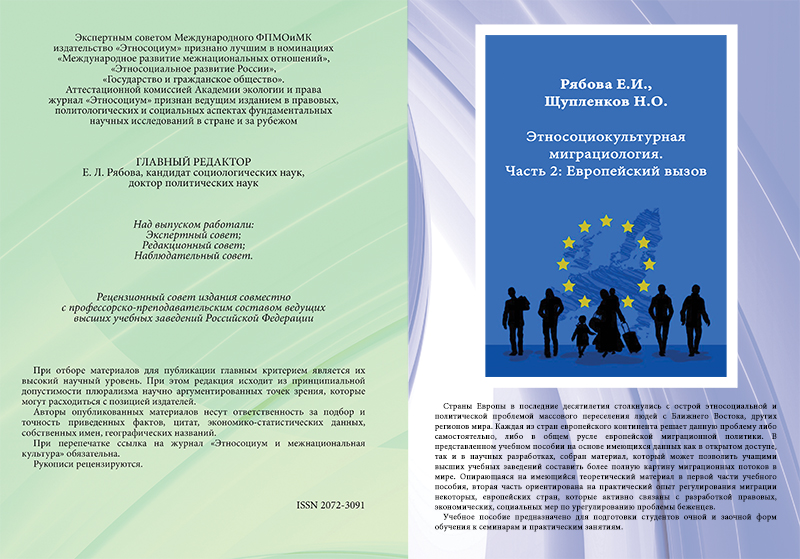

Content
|
COUNCIL OF INTERNATIONAL RELATIONSHIP
|
|
|
Sokolova L.I. The development of political advertising in the digital space
|
9
|
|
ACTUAL PROBLEMS OF MODERN SOCIETY
|
|
|
Konkol M.M. Often mistakes made by bilinguals when consistently learning foreign languages
|
15
|
|
REGIONAL STUDY:
POLITICS, ECONOMICS, LAW
|
|
|
Potapova E.P., Chumagina E.V., Pozdnyakova P.A. Ethical and communicative competence of state and municipal employees in Vladimir region
|
21
|
|
Smirnova A.V. Effect of «reverse colonization» in the Karachay-Cherkess Republic
|
34
|
|
Bekirova F.S. Principle of availability of the constitutional justice
|
39
|
|
INTERNATIONAL RELATIONSHIPS:
POLITICS, ECONOMICS, LAW
|
|
|
Andreev A.V. The visit of North Korean leader Kim Jong-un to Russia in 2019: resonance expectations, updating discourse and foreign policy re-positioning of Russia
|
45
|
|
Shamarov P.V. Modern Russian peacekeeping: problem of staffing
|
57
|
|
Devyatov R.S. The main stages of the state cultural policy development in modern Japan
|
67
|
|
Ternovaya L.O. The history of shoes as a history of power: from Tutankhamun's sandals to labutenes
|
78
|
|
Tambi S.A. Estonian Settlers of the Kabböle Fisherman's Village in Finland
|
88
|
|
CONFERENCE
|
|
|
Rodionov M.A., Volkova T.A. Features of the functioning of political elites in the formation of a new world order
|
102
|
|
Abstracts
|
119
|
|
Authors
|
132
|
|
Requirements to materials submitted to the international publishing house "Etnosocium"
|
135
|
In modern politics, global processes of change and transformation occur, caused by the informatization and digitalization of all spheres of social life. A new communicative space appears, in which the share of political, economic and social ties is increasing. As a result of the active introduction of digital space in the functioning of social life, there is a need to highlight information in a new format, and therefore, if we consider the political side of the problem, the media and political marketing change and transformation. The study of a new, previously non-existent space of information exchange forms the relevance of this article. Political advertising appears in the digital space at the end of the last century. Initially, the use of political advertising was based on the personal experience of political consultants, without relying on research and scientific justification. However, with the increasing complexity of the digital space, as well as the increasing importance of the Internet for political and social events in society, the need arose for a more detailed and thorough study of digital political advertising. Among domestic researchers, the works of A.I. Soloviev, S.F. Lisovsky, A.Deyan, L.Devlin are worth noting. At the present stage, the subject of digital political advertising is an important aspect of the development of political technologies and political marketing.
Keywords: political advertising, digital space, political marketing, internet communications, political technologies.
The article explores language interference that appears while learning several foreign languages. The aim of the analysis is to study the mistakes that appear due to the non-coincidence of grammar and vocabulary of a bilinguist with grammar and vocabulary of a native speaker and the levels of one language that interfere with the levels of another. The development of language thinking is the key to successfully overcome language interference.
Keywords: interference, mistake, transfer, consequent learning, language level, language thinking.
According to the latest regulatory documents in the field of state personnel policy, the professional development of employees of executive bodies should be carried out on a systematic basis, including the accelerated acquisition of new knowledge and skills, the development of one’s professional and personal qualities, through self-study materials that correspond to the direction of their professional performance. The results of expert interviews based on transdisciplinary methodology of scientific research show the heterogeneous nature of the formation of managerial competencies of modern state and municipal employees, due to the personal specifics of cognitive (mental) abilities.
The authors come to the conclusion that it is necessary to introduce into the process of professional training of future specialists heterogeneous methods of assimilation and development of new managerial competencies in order to enhance their personality and professional development, which can also contribute to enhancing the prestige of state bodies and local governments and the level of public confidence in employees' activities.
Keywords: State and municipal servants, professional culture, administrative competences, fractal, cyberumwelt, cognitive (mental) abilities.
The article is devoted to the actual issue of the outflow of the Russian population from Karachay-Cherkessia, the territory that for centuries they conquered and created. Having Russian colonization of the North Caucasus, in particular, Karachay-Cherkessia, the author comes to the conclusion that at present there is a process of "reverse colonization", the outflow of the Russian population due to high ethnic tensions, actively spreading xenophobia and the actual civil insecurity of the Russian and Russian-speaking population.
Keyword: Karachay-Cherkess Republic, colonization, mahajirstvo, outflow of the Russian population.
In article the concept and characteristics of the principle of availability of the constitutional justice which is one of the fundamental beginnings of activity of the Constitutional Court of the Russian Federation are considered, availability of the constitutional justice to citizens is defined.
Keywords: Constitution, constitutional justice, availability, principle, court.
In this article, based on the analysis of the general political context surrounding the problem of demilitarization of the Korean Peninsula and the lifting of Western sanctions against the DPRK, the author considers the visit of North Korean leader Kim Jong-Un to Russia and his meeting with President Vladimir Putin in 2019 as a "delayed" resonant event associated with the foreign policy re-positioning of the Russian Federation. The article analyzes the current condition of bilateral relations between Russia and the DPRK and the role of Russia as an effective co-sponsor of the process of settlement of the "Korean problem". The author connects the re-positioning of Russia in the context of the "Korean problem" with the renewal of the state discourse, which is the basis of the country's foreign policy, and considers the "symbolic capital" accumulated within this discourse as a possible basis for the Russian policy of "soft power" towards foreign countries.
Keywords: Korean problem, foreign policy strategy, political discourse, political resonance, symbolic capital, "soft power".
The article examines the possibilities of improving the quality of training peacekeeping military and police personnel in Russia in order to strengthen the national security of the country, increase its geopolitical influence in the world and increase the peacekeeping rating in the UN Methods and options for multiplying the personnel potential of domestic peacekeeping practice are proposed and justified, the fundamental difference between such unequal notions as conventional military actions of the classical type and specialized activities in the UN peacekeeping field is revealed and disclosed. Actual government tasks are formulated to improve the system of selection and training of Russian peacekeepers, justifies the need to develop training programs and innovative methods in the field of international peacemaking, expanding the capabilities of the domestic training material base taking into account the advanced experience of specialized training centers of leading countries-suppliers of national peacekeeping contingents to international forces UN.
Keywords: UN, standards, requirements, criteria, national security, international peacekeeping, peacekeeping, peacekeeping operations, contingent, personnel, staffing, selection, training, competencies.
The article describes the main stages of development of the state cultural policy in Japan after the Second World War. The author carries out a comparative analysis of the two versions of the Basic law regulating the support of culture and art by public authorities. Particular attention is paid to interest groups and experts representing them, which have a direct impact on the decision - making process in this sphere. As a result, it is concluded that there are two directions of cultural activity, periodically entering into a certain competition with each other - national, traditional, income-oriented, and non-profit anti-authoritarian, aimed at the disclosure of the cultural potential of the individual.
Keywords: culture, art. Japan, national traditions, cultural rights.
Many consider power to be a mysterious phenomenon. It penetrates into all areas of a person's life, embraces his personal world and social relations. In the global world there is competition on the margins of global governance for retention in one hand, for one state as many levers of power as possible. But if you expand power into components, then many riddles are dispelled. Such components include a visual image of power, or rather, those who are in the leadership of countries, social movements and organizations. The elements of this visual image include shoes. Its history vividly reflects the development of power.
Keywords: power, global governance, history, shoes, visualization.
The paper examines the process of migration of Estonians to the Finnish fishing village of Kabböle and their life in this place. The author tells about the cultural and economic life of Kabböle Estonian migrants, development of their community, contacts between Estonians and Finns, on the one hand, and Finnish Swedes, on the other hand. So far, there are no comprehensive studies on the life of Kabböle Estonians in Russian and Estonian languages. The paper is written on the basis of materials of Estonian archives and publications in newspapers, as well as sources in Estonian, Russian, Finnish and Swedish languages. The main methods used in the study are the generalization method, the system approach, the historical descriptive method, the document analysis method and the empirical description method.
Keywords: Estonians, Estonia, Finland, Kabböle, history, ethnography.
The features of the functioning of political elites in the conditions of modern geopolitical changes leading to the formation and establishment of the world pattern of the future are considered. It is substantiated that the technologies of social control applied by modern power elites do not sufficiently correspond to global challenges in the era of transition to a new world order, analyze ways to improve the activities of political elites.
Keywords: political elites, public administration, national security, information security, information technology, artificial intelligence, corruption, strategic culture.